 At Sterling Sky (my company), we only work in the small business (SMB) market, so we were particularly interested in seeing how Google’s recent algorithm update impacted local search.
At Sterling Sky (my company), we only work in the small business (SMB) market, so we were particularly interested in seeing how Google’s recent algorithm update impacted local search.
I’ve spent the last few weeks analyzing dozens of sites in depth, diving into ranking charts and before-and-after screen shots to see exactly what changed with this recent update. Below are the top six things I’ve noticed as a result of the update.
Keep in mind these are observations based on my audits and findings. Since I only analyzed sites optimized for local SEO, these findings are very specific to local businesses or sites ranking for local terms such as “plumber Seattle.”
I was careful to only include items I saw multiple times across numerous sites and industries I analyzed. I try to give examples to help illustrate my points but wanted to make it clear there were tons of similar examples in my findings that showed the same thing.
1. This update was not related to links
As far as we can tell, this update was related to on-site content quality more than backlinks. We have a new client of two months who saw an increase organically across almost every keyword we are tracking. All the work done so far on his site has been related to improving content quality — no links were built.
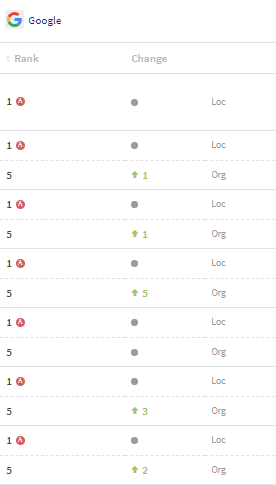
2. Keyword impact
In the local search world, it is hard to get a business to rank in the 3-pack in a surrounding city, but it is sometimes possible.
We work with a company in a suburb of a large city. Let’s say they’re in Addison, Texas, but they get all their customers from Dallas (They’re not, but it’s a similar scenario). With this update, the majority of keywords we were tracking that used [keyword + Dallas] increased, even though his location is in Addison (the suburb of Dallas).
In another example, Tom Waddington sent me an example of a business that decreased both locally and organically for the name of the major city but sustained rankings for the suburb (where they are actually located).
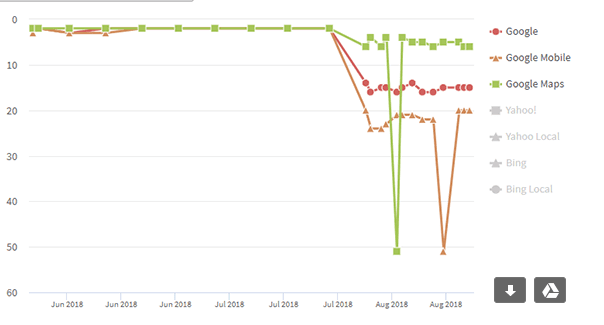
3. Organic and local results changed
We have ranking trackers that scan all our accounts daily so it makes algorithm updates easier to track. Many algorithm updates only impact the organic results or the local results, but we are seeing that this update impacted both. We are also seeing a small gap between the two updates. The local update seemed to have happened over July 31-August 1, and the organic update happened from August 1-2.
4. The gap between organic and local algorithms increasing
Usually, there is a strong correlation between the sites that rank organically and the listings that rank in the local results. However, with this update, I haven’t seen much correlation at all. Sites that had big organic increases did not simultaneously have big increases in local rankings and vice versa.
Also, we saw more examples where the patterns were completely opposite. Sites that increased organically dropped locally and vice versa like this:
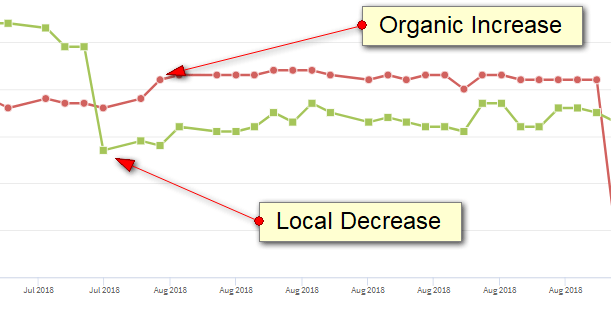
In another example, a site saw a decline in organic traffic consistently with all the quality updates this year. However, their local rankings and telephone calls from Google My Business (GMB) have increased substantially, and they are getting almost triple the calls from GMB they were getting at the beginning of the year.

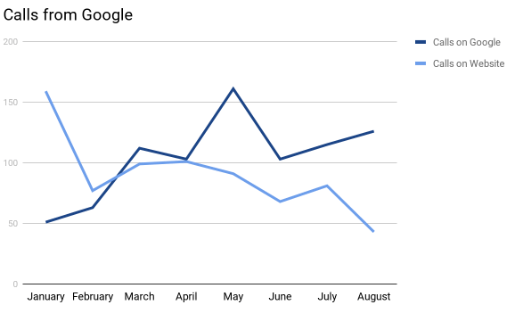
5. Video carousels increased for local search terms
For tons of keywords I looked at across numerous industries, we saw an increase in video carousels that did not exist before the update.

6. YMYL impacted heavily
I agree with Marie Haynes, who said this update was really focused around Your Money or Your Life (YMYL)-type sites. I’m seeing the biggest movement in industries related to healthcare.
I audited an attorney’s site and found that the big drops were related to pages about specific medical malpractice lawsuits. Another drug rehab site lost two-thirds of their traffic overnight.
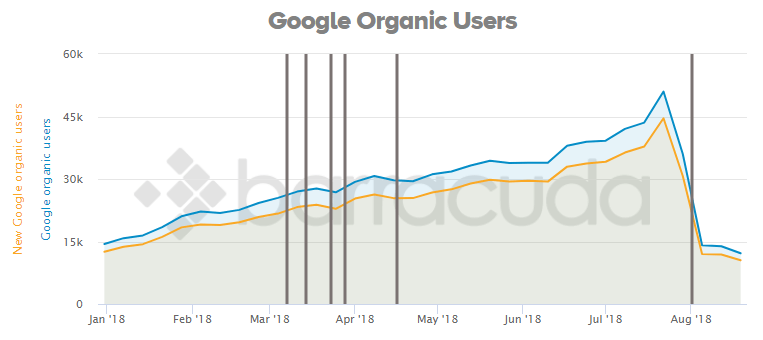
Have you noticed changes to your sites since the algorithm update? Are the changes you’re seeing different from mine? I’d love to hear about it, so please feel free to share your findings with me here.
Contributing authors are invited to create content for Search Engine Land and are chosen for their expertise and contribution to the search community. Our contributors work under the oversight of the editorial staff and contributions are checked for quality and relevance to our readers. The opinions they express are their own.



